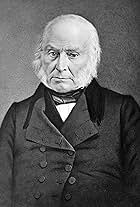John Quincy Adams(1767-1848)
His father, John Adams, served as the second president of the United States from 1797 to 1801. In 1779, at the age of 12, the young Adams accompanied his father to Europe. There the linguistically gifted boy supported the US embassy as a translator and secretary. When Adams enrolled at Harvard in 1785, he already had knowledge of Greek, Latin, French, Dutch and German. After studying law, he began working as a lawyer in Boston in 1790. At the same time, he gained a certain level of notoriety by writing political essays for the press in support of George Washington's administration. In 1793 the young Adams was sent to the Netherlands as a diplomat. On a diplomatic mission to London he met the American consulate's daughter Louisa Catherine Johnson, whom he married in 1797. In the same year Adams was sent as an envoy to Prussia.
Returning to the United States, he was elected to the Massachusetts Senate in 1801. In 1803 he was appointed to the US Senate, where he served until 1808. In 1809, Adams went on a diplomatic mission to Russia, where he was able to win over Tsar Alexander as a mediator in the American conflict with Great Britain. In 1812 he helped negotiate the peace treaty with Great Britain. From 1815 Adams worked as an ambassador in London. Two years later, he was appointed Secretary of State by President James Monroe. In complete agreement with the president, in this role until 1825 he contributed to raising the USA to an equal size with the European powers, giving them independent diplomacy and helping them make territorial gains. In this context, Adams was instrumental in the negotiations that led to the acquisition of Florida and the securing of Louisiana's western border. In 1823 he contributed to the development of the "Monroe Doctrine".
In 1824, Adams won the American presidential election to become the sixth president of the United States for one term from the following year. However, his policy of internal reform and national consolidation was largely unsuccessful due to opposition resistance. In the election campaign of 1828, John Quincy Adams was overwhelmingly defeated by Andrew Jackson, who succeeded him as president a year later. After a temporary withdrawal from political life, Adams was elected to the House of Representatives in 1831, where he served until his death in 1848. As an independent, he took up the demand for the abolition of slavery without joining the ranks of the abolitionists. Soon after, he suffered a stroke in the House of Representatives.
John Quincy Adams died on February 23, 1848 in Washington.
Returning to the United States, he was elected to the Massachusetts Senate in 1801. In 1803 he was appointed to the US Senate, where he served until 1808. In 1809, Adams went on a diplomatic mission to Russia, where he was able to win over Tsar Alexander as a mediator in the American conflict with Great Britain. In 1812 he helped negotiate the peace treaty with Great Britain. From 1815 Adams worked as an ambassador in London. Two years later, he was appointed Secretary of State by President James Monroe. In complete agreement with the president, in this role until 1825 he contributed to raising the USA to an equal size with the European powers, giving them independent diplomacy and helping them make territorial gains. In this context, Adams was instrumental in the negotiations that led to the acquisition of Florida and the securing of Louisiana's western border. In 1823 he contributed to the development of the "Monroe Doctrine".
In 1824, Adams won the American presidential election to become the sixth president of the United States for one term from the following year. However, his policy of internal reform and national consolidation was largely unsuccessful due to opposition resistance. In the election campaign of 1828, John Quincy Adams was overwhelmingly defeated by Andrew Jackson, who succeeded him as president a year later. After a temporary withdrawal from political life, Adams was elected to the House of Representatives in 1831, where he served until his death in 1848. As an independent, he took up the demand for the abolition of slavery without joining the ranks of the abolitionists. Soon after, he suffered a stroke in the House of Representatives.
John Quincy Adams died on February 23, 1848 in Washington.
